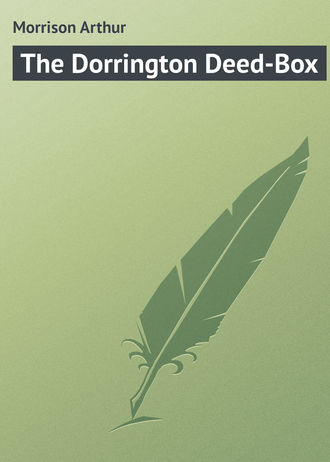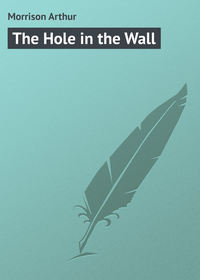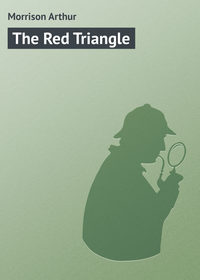 полная версия
полная версияThe Dorrington Deed-Box
Dorrington mended a quill with ostentatious care, saying encouragingly as he did so, "I can quite understand that you may not wish to prosecute your cousin – only to recover the diamond you speak of. Also I can quite understand that there may be reasons – family reasons perhaps, perhaps others – which may render it inadvisable to make even the existence of the jewel known more than absolutely necessary. For instance, there may be other claimants, Monsieur Léon Bouvier."
The visitor started. "You know my name then?" he asked. "How is that?"
Dorrington smiled the smile of a sphinx. "M. Bouvier," he said, "it is my trade to know everything – everything." He put the pen down and gazed whimsically at the other. "My agents are everywhere. You talk of the secret agent of the Russian police – they are nothing. It is my trade to know all things. For instance" – Dorrington unlocked a drawer and produced a book (it was but an office diary), and, turning its pages, went on. "Let me see – B. It is my trade, for instance, to know about the Café des Bons Camarades, established by the late Madame Bouvier, now unhappily deceased. It is my trade to know of Madame Bouvier at Bonneuil, where the charcoal was burnt, and where Madame Bouvier was unfortunately left a widow at the time of the siege of Paris, because of some lamentable misunderstanding of her husband's with a file of Prussian soldiers by an orchard wall. It is my trade, moreover, to know something of the sad death of that husband's brother – in a pit – and of the later death of his widow. Oh yes. More" (turning a page attentively, as though following detailed notes), "it is my trade to know of a little quarrel between those brothers – it might even have been about a diamond, just such a diamond as you have come about to-night – and of jewels missed from the Tuileries in the great Revolution a hundred years ago." He shut the book with a bang and returned it to its place. "And there are other things – too many to talk about," he said, crossing his legs and smiling calmly at the Frenchman.
During this long pretence at reading, Bouvier had slid farther and farther forward on his chair, till he sat on the edge, his eyes staring wide, and his chin dropped. He had been pale when he arrived, but now he was of a leaden gray. He said not a word.
Dorrington laughed lightly. "Come," he said, "I see you are astonished. Very likely. Very few of the people and families whose dossiers we have here" (he waved his hand generally about the room) "are aware of what we know. But we don't make a song of it, I assure you, unless it is for the benefit of clients. A client's affairs are sacred, of course, and our resources are at his disposal. Do I understand that you become a client?"
Bouvier sat a little farther back on his chair and closed his mouth. "A – a – yes," he answered at length, with an effort, moistening his lips as he spoke. "That is why I come."
"Ah, now we shall understand each other," Dorrington replied genially, opening an ink-pot and clearing his blotting-pad. "We're not connected with the police here, or anything of that sort, and except so far as we can help them we leave our client's affairs alone. You wish to be a client, and you wish me to recover your lost diamond. Very well, that is business. The first thing is the usual fee in advance – twenty guineas. Will you write a cheque?"
Bouvier had recovered some of his self-possession, and he hesitated. "It is a large fee," he said.
"Large? Nonsense! It is the sort of fee that might easily be swallowed up in half a day's expenses. And besides – a rich diamond merchant like yourself!"
Bouvier looked up quickly. "Diamond merchant?" he said. "I do not understand. I have lost my diamond – there was but one."
"And yet you go to Hatton Garden every day."
"What!" cried Bouvier, letting his hand fall from the table, "you know that too?"
"Of course," Dorrington laughed, easily; "it is my trade, I tell you. But write the cheque."
Bouvier produced a crumpled and dirty cheque-book and complied, with many pauses, looking up dazedly from time to time into Dorrington's face.
"Now," said Dorrington, "tell me where you kept your diamond, and all about it."
"It was in an old little wooden box – so." Bouvier, not yet quite master of himself, sketched an oblong of something less than three inches long by two broad. "The box was old and black – my grandfather may have made it, or his father. The lid fitted very tight, and the inside was packed with fine charcoal powder with the diamond resting in it. The diamond – oh, it was great; like that – so." He made another sketch, roughly square, an inch and a quarter across. "But it looked even much greater still, so bright, so wonderful! It is easy to understand that my grandfather did not sell it – beside the danger. It is so beautiful a thing, and it is such great riches – all in one little box. Why should not a poor charcoal-burner be rich in secret, and look at his diamond, and get all the few things he wants by burning his charcoal? And there was the danger. But that is long ago. I am a man of beesness, and I desired to sell it and be rich. And that Jacques – he has stolen it!"
"Let us keep to the point. The diamond was in a box. Well, where was the box?"
"On the outside of the box there were notches – so, and so. Round the box at each place there was a tight, strong, silk cord – that is two cords. The cords were round my neck, under my shirt, so. And the box was under my arm – just as a boy carries his satchel, but high up – in the armpit, where I could feel it at all times. To-night, when I come to myself, my collar was broken at the stud – see – the cords were cut – and all was gone!"
"You say your cousin Jacques has done this. How do you know?"
"Ah! But who else? Who else could know? And he has always tried to steal it. At first, I let him wait at the Café des Bons Camarades. What does he do? He prys about my house, and opens drawers; and I catch him at last looking in a box, and I turn him out. And he calls me a thief! Sacré! He goes – I have no more of him; and so – he does this!"
"Very well. Write down his name and address on this piece of paper, and your own." Bouvier did so. "And now tell me what you have been doing at Hatton Garden."
"Well, it was a very great diamond – I could not go to the first man and show it to sell. I must make myself known."
"It never struck you to get the stone cut in two, did it?"
"Eh? What? —Nom de chien! No!" He struck his knee with his hand. "Fool! Why did I not think of that? But still" – he grew more thoughtful – "I should have to show it to get it cut, and I did not know where to go. And the value would have been less."
"Just so – but it's the regular thing to do, I may tell you, in cases like this. But go on. About Hatton Garden, you know."
"I thought that I must make myself known among the merchants of diamonds, and then, perhaps, I should learn the ways, and one day be able to sell. As it was, I knew nothing – nothing at all. I waited, and I saved money in the café. Then, when I could do it, I dressed well and went and bought some diamonds of a dealer – very little diamonds, a little trayful for twenty pounds, and I try to sell them again. But I have paid too much – I can only sell for fifteen pounds. Then I buy more, and sell them for what I give. Then I take an office in Hatton Garden – that is, I share a room with a dealer, and there is a partition between our desks. My wife attends the café, I go to Hatton Garden to buy and sell. It loses me money, but I must lose till I can sell the great diamond. I get to know the dealers more and more, and then to-night, as I go home – " he finished with an expressive shrug and a wave of the hand.
"Yes, yes, I think I see," Dorrington said. "As to the diamond again. It doesn't happen to be a blue diamond, does it?"
"No – pure white; perfect."
Dorrington had asked because two especially famous diamonds disappeared from among the French Crown jewels at the time of the great Revolution. One blue, the greatest coloured diamond ever known, and the other the "Mirror of Portugal." Bouvier's reply made it plain that it was certainly not the first which he had just lost.
"Come," Dorrington said, "I will call and inspect the scene of your disaster. I haven't dined yet, and it must be well past nine o'clock now."
They returned to Beck Street. There were gates at the dark entry by the side of the Café des Bons Camarades, but they were never shut, Bouvier explained. Dorrington had them shut now, however, and a lantern was produced. The paving was of rough cobble stones, deep in mud.
"Do many people come down here in the course of an evening?" Dorrington asked.
"Never anybody but myself."
"Very well. Stand away at your side door."
Bouvier and his wife stood huddled and staring on the threshold of the side door, while Dorrington, with the lantern, explored the muddy cobble stones. The pieces of a broken bottle lay in a little heap, and a cork lay a yard away from them. Dorrington smelt the cork, and then collected together the broken glass (there were but four or five pieces) from the little heap. Another piece of glass lay by itself a little way off, and this also Dorrington took up, scrutinising it narrowly. Then he traversed the whole passage carefully, stepping from bare stone to bare stone, and skimming the ground with the lantern. The mud lay confused and trackless in most places, though the place where Bouvier had been lying was indicated by an appearance of sweeping, caused, no doubt, by his wife dragging him to his feet. Only one other thing beside the glass and cork did Dorrington carry away as evidence, and that the Bouviers knew nothing of; for it was the remembrance of the mark of a sharp, small boot-heel in more than one patch of mud between the stones.
"Will you object, Madame Bouvier," he asked, as he handed back the lantern, "to show me the shoes you wore when you found your husband lying out here?"
Madame Bouvier had no objection at all. They were what she was then wearing, and had worn all day. She lifted her foot and exhibited one. There was no need for a second glance. It was a loose easy cashmere boot, with spring sides and heels cut down flat for indoor comfort.
"And this was at what time?"
It was between seven and eight o'clock, both agreed, though they differed a little as to the exact time. Bouvier had recovered when his wife raised him, had entered the house with her, at once discovered his loss, and immediately, on his wife's advice, set out to find Dorrington, whose name the woman had heard spoken of frequently among the visitors to the café in connection with the affair of the secret society already alluded to. He had felt certain that Dorrington would not be at his office, but trusted to be directed where to find him.
"Now," Dorrington asked of Bouvier (the woman had been called away), "tell me some more about your cousin. Where does he live?"
"In Little Norham Street; the third house from this end on the right and the back room at the top. That is unless he has moved just lately."
"Has he been ill recently?"
"Ill?" Bouvier considered. "Not that I can say – no. I have never heard of Jacques being ill." It seemed to strike him as an incongruous and new idea. "Nothing has made him ill all his life – he is too good in constitution, I think."
"Does he wear spectacles?"
"Spectacles? Mais non! Never! Why should he wear spectacles? His eyes are good as mine."
"Very well. Now attend. To-morrow you must not go to Hatton Garden – I will go for you. If you see your cousin Jacques you must say nothing, take no notice; let everything proceed as though nothing had happened; leave all to me. Give me your address at Hatton Garden."
"But what is it you must do there?"
"That is my business. I do my business in my own way. Still I will give you a hint. Where is it that diamonds are sold? In Hatton Garden, as you so well know – as I expect your cousin knows if he has been watching you. Then where will your cousin go to sell it? Hatton Garden, of course. Never mind what I shall do there to intercept it. I am to be your new partner, you understand, bringing money into the business. You must be ill and stay at home till you hear from me. Go now and write me a letter of introduction to the man who shares the office with you. Or I will write it if you like, and you shall sign it. What sort of a man is he?"
"Very quiet – a tall man, perhaps English, but perhaps not."
"Ever buy or sell diamonds with him?"
"Once only. It was the first time. That is how I learned of the half-office to let."
The letter was written, and Dorrington stuffed it carelessly into his pocket. "Mr. Hamer is the name, is it?" he said. "I fancy I have met him somewhere. He is short-sighted, isn't he?"
"Oh yes, he is short-sighted. With pince-nez."
"Not very well lately?"
"No – I think not. He takes medicine in the office. But you will be careful, eh? He must not know."
"Do you think so? Perhaps I may tell him, though."
"Tell him? Ciel– no! You must not tell people! No!"
"Shall I throw the whole case over, and keep your deposit fee?"
"No – no, not that. But it is foolish to tell to people!"
"I am to judge what is foolish and what wise, M. Bouvier. Good evening!"
"Good evening, M. Dorrington; good evening." Bouvier followed him out to the gate. "And will you tell me – do you think there is a way to get the diamond? Have you any plan?"
"Oh yes, M. Bouvier, I have a plan. But, as I have said, that is my business. It may be a successful plan, or it may not; that we shall see."
"And – and the dossier. The notes that you so marvellously have, written out in the book you read. When this business is over you will destroy them, eh? You will not leave a clue?"
"The notes that I have in my books," answered Dorrington, without relaxing a muscle of his face, "are my property, for my own purposes, and were mine before you came to me. Those relating to you are a mere item in thousands. So long as you behave well, M. Bouvier, they will not harm you, and, as I said, the confidences of a client are sacred to Dorrington & Hicks. But as to keeping them – certainly I shall. Once more – good evening!"
Even the stony-faced Dorrington could not repress a smile and something very like a chuckle as he turned the end of the street and struck out across Golden Square towards his rooms in Conduit Street. The simple Frenchman, only half a rogue – even less than half – was now bamboozled and put aside as effectually as his cousin had been. Certainly there was a diamond, and an immense one; if only the Bouvier tradition were true, probably the famous "Mirror of Portugal"; and nothing stood between Dorrington and absolute possession of that diamond but an ordinary sort of case such as he dealt with every day. And he had made Bouvier pay a fee for the privilege of putting him completely on the track of it! Dorrington smiled again.
His dinner was spoilt by waiting, but he troubled little of that. He spread before him, and examined again, the pieces of glass and the cork. The bottle had been a druggist's ordinary flat bottle, graduated with dose-marks, and altogether seven inches high, or thereabout. It had, without a doubt, contained the chloroform wherewith Léon Bouvier had been assaulted, as Dorrington had judged from the smell of the cork. The fact of the bottle being corked showed that the chloroform had not been bought all at once – since in that case it would have been put up in a stoppered bottle. More probably it had been procured in very small quantities (ostensibly for toothache, or something of that kind) at different druggists, and put together in this larger bottle, which had originally been used for something else. The bottle had been distinguished by a label – the usual white label affixed by the druggist, with directions as to taking the medicine – and this label had been scraped off; all except a small piece at the bottom edge by the right hand side, whereon might be just distinguished the greater part of the letters N, E. The piece of glass that had lain a little way apart from the bottle was not a part of it, as a casual observer might have supposed. It was a fragment of a concave lens, with a channel ground in the edge.
IIIAt ten precisely next morning, as usual, Mr. Ludwig Hamer mounted the stairs of the house in Hatton Garden, wherein he rented half a room as office. He was a tall, fair man, wearing thick convex pince-nez. He spoke English like a native, and, indeed, he called himself an Englishman, though there were those who doubted the Briticism of his name. Scarce had he entered his office when Dorrington followed him.
The room had never been a very large one, and now a partition divided it in two, leaving a passage at one side only, by the window. On each side of this partition stood a small pedestal table, a couple of chairs, a copying-press, and the other articles usual in a meagrely furnished office. Dorrington strode past Bouvier's half of the room and came upon Hamer as he was hanging his coat on a peg. The letter of introduction had been burnt, since Dorrington had only asked for it in order to get Hamer's name and the Hatton Garden address without betraying to Bouvier the fact that he did not already know all about it.
"Good morning, Mr. Hamer," said Dorrington, loudly. "Sorry to see you're not well" – he pointed familiarly with his stick at a range of medicine bottles on the mantelpiece – "but it's very trying weather, of course. You've been suffering from toothache, I believe?"
Hamer seemed at first disposed to resent the loudness and familiarity of this speech, but at the reference to toothache he started suddenly and set his lips.
"Chloroform's a capital thing for toothache, Mr. Hamer, and for – for other things. I'm not in your line of business myself, but I believe it has even been used in the diamond trade."
"What do you mean?" asked Hamer, flushing angrily.
"Mean? Why, bless me – nothing more than I said. By the way, I'm afraid you dropped one of your medicine bottles last night. I've brought it back, though I'm afraid it's past repair. It's a good job you didn't quite clear the label off before you took it out with you, else I might have had a difficulty." Dorrington placed the fragments on the table. "You see you've just left the first letter of 'E.C.' in the druggist's address, and the last 'N' of Hatton Garden, just before it. There doesn't happen to be any other Garden in E.C. district that I know of, nor does the name of any other thoroughfare end in N – they are mostly streets, or lanes, or courts, you see. And there seems to be only one druggist in Hatton Garden – capital fellow, no doubt – the one whose name and address I observe on those bottles on the mantelpiece."
Dorrington stood with his foot on a chair, and tapped his knee carelessly with his stick. Hamer dropped into the other chair and regarded him with a frown, though his face was pale. Presently he said, in a strained voice, "Well?"
"Yes; there is something else, Mr. Hamer, as you appear to suggest. I see you're wearing a new pair of glasses this morning; pity you broke the others last night, but I've brought the piece you left behind." He gathered up the broken bottle, and held up the piece of concave lens. "I think, after all, it's really best to use a cord with pince-nez. It's awkward, and it catches in things, I know, but it saves a breakage, and you're liable to get the glasses knocked off, you know – in certain circumstances."
Hamer sprang to his feet with a snarl, slammed the door, locked it, and turned on Dorrington. But now Dorrington had a revolver in his hand, though his manner was as genial as ever.
"Yes, yes," he said; "best to shut the door, of course. People listen, don't they? But sit down again. I'm not anxious to hurt you, and, as you will perceive, you're quite unable to hurt me. What I chiefly came to say is this: last evening my client, M. Léon Bouvier, of this office and the Café des Bons Camarades, was attacked in the passage adjoining his house by a man who was waiting for him, with a woman – was it really Mrs. Hamer? but there, I won't ask – keeping watch. He was robbed of a small old wooden box, containing charcoal and – a diamond. My name is Dorrington – firm of Dorrington & Hicks, which you may have heard of. That's my card. I've come to take away that diamond."
Hamer was pale and angry, but, in his way, was almost as calm as Dorrington. He put down the card without looking at it. "I don't understand you," he said. "How do you know I've got it?"
"Come, come, Mr. Hamer," Dorrington replied, rubbing the barrel of his revolver on his knee, "that's hardly worthy of you. You're a man of business, with a head on your shoulders – the sort of man I like doing business with, in fact. Men like ourselves needn't trifle. I've shown you most of the cards I hold, though not all, I assure you. I'll tell you, if you like, all about your little tour round among the druggists with the convenient toothache, all about the evenings on which you watched Bouvier home, and so on. But, really, need we, as men of the world, descend to such peddling detail?"
"Well, suppose I have got it, and suppose I refuse to give it you. What then?"
"What then? But why should we talk of unpleasant things? You won't refuse, you know."
"Do you mean you'd get it out of me by help of that pistol?"
"Well," said Dorrington, deliberately, "the pistol is noisy, and it makes a mess, and all that, but it's a useful thing, and I might do it with that, you know, in certain circumstances. But I wasn't thinking of it – there's a much less troublesome way."
"Which?"
"You're a slower man than I took you for, Mr. Hamer – or perhaps you haven't quite appreciated me yet. If I were to go to that window and call the police, what with the little bits of evidence in my pocket, and the other little bits that the druggists who sold the chloroform would give, and the other bits in reserve, that I prefer not to talk about just now – there would be rather an awkwardly complete case of robbery with violence, wouldn't there? And you'd have to lose the diamond after all, to say nothing of a little rest in gaol and general ruination."
"That sounds very well, but what about your client? Come now, you call me a man of the world, and I am one. How will your client account for the possession of a diamond worth eighty thousand pounds or so? He doesn't seem a millionaire. The police would want to know about him as well as about me, if you were such a fool as to bring them in. Where did he steal it, eh?"
Dorrington smiled and bowed at the question. "That's a very good card to play, Mr. Hamer," he said, "a capital card, really. To a superficial observer it might look like winning the trick. But I think I can trump it." He bent farther forward and tapped the table with the pistol-barrel. "Suppose I don't care one solitary dump what becomes of my client? Suppose I don't care whether he goes to gaol or stays out of it – in short, suppose I prefer my own interests to his?"
"Ho! ho!" Hamer cried. "I begin to understand. You want to grab the diamond for yourself then?"
"I haven't said anything of the kind, Mr. Hamer," Dorrington replied, suavely. "I have simply demanded the diamond which you stole last night, and I have mentioned an alternative."
"Oh, yes, yes, but we understand one another. Come, we'll arrange this. How much do you want?"
Dorrington stared at him stonily. "I – I beg your pardon," he said, "but I don't understand. I want the diamond you stole."
"But come now, we'll divide. Bouvier had no right to it, and he's out. You and I, perhaps, haven't much right to it, legally, but it's between us, and we're both in the same position."
"Pardon me," Dorrington replied, silkily, "but there you mistake. We are not in the same position, by a long way. You are liable to an instant criminal prosecution. I have simply come, authorised by my client, who bears all the responsibility, to demand a piece of property which you have stolen. That is the difference between our positions, Mr. Hamer. Come now, a policeman is just standing opposite. Shall I open the window and call him, or do you give in?"
"Oh, I give in, I suppose," Hamer groaned. "But you're a deal too hard. A man of your abilities shouldn't be so mean."






